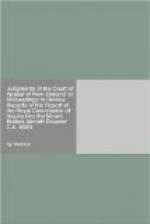“393. In my opinion therefore, the single dominant and effective cause of the disaster was the mistake made by those airline officials who programmed the aircraft to fly directly at Mt. Erebus and omitted to tell the aircrew. That mistake is directly attributable, not so much to the persons who made it, but to the incompetent administrative airline procedures which made the mistake possible.
394. In my opinion,
neither Captain Collins nor First Officer
Cassin nor the flight
engineers made any error which contributed to
the disaster, and were
not responsible for its occurrence.”
Jurisdiction to Review
Several important questions arise in this case. Is there jurisdiction in the Courts to review in such a context as this taking into account the ambit of ss. 3 and 4 of the Judicature Amendment Act 1972? And if there is such power is it by reason of the award of costs in this case? Or on grounds relating to excess of jurisdiction on the part of the Commissioner? Or considerations of natural justice? Or by reference to all three of those matters? For the reasons that follow we are satisfied that the findings are reviewable and that each one of those three matters is properly within the scope of the Court’s jurisdiction.
As already mentioned, the proceedings are by way of application for review under the Judicature Amendment Act 1972 and are directed against certain findings in the Report, to which we have referred. The applicants claim that those findings are invalid, in excess of jurisdiction or made in circumstances involving unfairness or breach of natural justice. They seek declarations to that effect and orders setting aside the findings and quashing the order that Air New Zealand pay $150,000 as a contribution to the public cost of the inquiry. It is necessary to consider whether under the Act the Court has jurisdiction to grant such relief in this case.
By ss. 3 and 4 of the Act relief may be granted only where a “statutory power” is involved. That term includes a “statutory power of decision”. Since liberalizing amendments made in 1977, “statutory power” includes power conferred by or under any Act “to make any investigation or inquiry into the rights, powers, privileges, immunities, duties, or liabilities of any person” and “statutory power of decision” includes power conferred by or under any Act “to make a decision ... affecting” any such rights, powers, privileges, duties or liabilities. Generally the relief available is confined by s. 4 to that which the applicant would have been entitled to in any one or more of the proceedings for mandamus, prohibition, certiorari, declaration or injunction; but there is a relevant exception in s. 4 (2) whereby if the applicant is entitled to an order declaring that a decision made in the exercise of a statutory power of decision is unauthorized or otherwise invalid the Court may set aside the decision instead.




